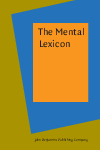
Mental Lexicon
Scope & Guideline
Exploring the Intersection of Language and Mind
Introduction
Aims and Scopes
- Lexical Processing and Representation:
Investigates how words are represented in the mind, including the structure and organization of the mental lexicon as it pertains to both native and second languages. - Morphological and Semantic Analysis:
Explores the relationships between morphological structures and their semantic implications, particularly in the context of language learning and processing. - Bilingualism and Multilingualism:
Examines the cognitive processes involved in bilingual and multilingual language use, including how multiple languages interact within the mental lexicon. - Psycholinguistic Approaches:
Utilizes experimental methods, such as eye-tracking and ERP studies, to understand the cognitive mechanisms behind language processing and lexical access. - Contextual Influences on Language Processing:
Studies how contextual factors, such as emotional valence and situational context, impact word recognition, meaning construction, and language use.
Trending and Emerging
- Emotional and Contextual Factors in Language Processing:
Recent studies emphasize the role of emotional valence and contextual information in vocabulary retention and processing, showcasing an increasing recognition of how emotions shape language experience. - Morphological Sensitivity in Language Learning:
Research on morphological awareness and its impact on language learning, particularly among adult learners, is gaining traction, indicating a shift towards understanding the cognitive underpinnings of language acquisition. - Cognitive Mechanisms in Bilingual Contexts:
There is a growing focus on the cognitive processes involved in bilingualism, including the effects of language proficiency and use on lexical choice and processing, reflecting the complexities of multilingual language environments. - Use of Advanced Methodologies:
The application of advanced experimental methodologies, such as eye-tracking and ERP, is on the rise, allowing for more nuanced insights into the timing and processes involved in lexical access and language comprehension.
Declining or Waning
- Traditional Syntax and Grammar:
Research focusing solely on traditional syntactic structures without considering cognitive or psycholinguistic factors is becoming less common, as the field increasingly emphasizes the interaction between syntax, semantics, and cognition. - Static Models of Language Processing:
The reliance on static or overly simplified models of language processing is waning, with a growing preference for dynamic and context-sensitive approaches that account for variability in language use. - Single Language Studies:
There is a noticeable decline in studies that focus exclusively on a single language, as the journal increasingly prioritizes comparative and cross-linguistic research that reflects the realities of multilingual language environments.
Similar Journals

REVUE DE LINGUISTIQUE ROMANE
Connecting Cultures Through Linguistic InsightsREVUE DE LINGUISTIQUE ROMANE, published by the esteemed SOCIÉTÉ LINGUISTIQUE ROMANE, is a prominent academic journal dedicated to the exploration of Romance linguistics. With its ISSN 0035-1458, the journal plays a significant role in advancing knowledge within the fields of linguistics and the history and philosophy of science. Although it does not currently offer Open Access, it provides critical insights and peer-reviewed research that are indispensable for scholars, educators, and students interested in the nuances of Romance languages. The journal, which has seen converged coverage from 2006 to 2017, and then again from 2019 to 2021, is ranked in the third quartile (Q3) across various categories within Scopus, reflecting its established presence in the academic community. As a vital resource for interdisciplinary studies, REVUE DE LINGUISTIQUE ROMANE is instrumental for those seeking to deepen their understanding of linguistic structures, cultural nuances, and the historical development of Romance languages.
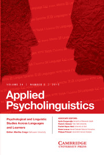
APPLIED PSYCHOLINGUISTICS
Fostering Innovation in Psycholinguistic ResearchApplied Psycholinguistics, published by Cambridge University Press, is a premier journal in the fields of linguistics, psychology, and cognitive science, with a focus on the intersection of language and psychological processes. Since its inception in 1980, the journal has consistently provided a platform for high-quality research, achieving impressive rankings in various categories as of 2023, including Q1 status in Linguistics and Language, and Q1 in Psychology (miscellaneous). With a focus on experimental and cognitive psychology, it fosters the exploration of language acquisition, social communication, and cognitive mechanisms underlying language use. Although it is not available as an Open Access journal, its rigorous peer-review process and impactful articles make it a significant resource for researchers, professionals, and students alike. The journal's commitment to advancing knowledge is evident through its contributions to both theoretical and applied psycholinguistic research. Whether you're a seasoned researcher or a student eager to delve into psycholinguistics, this journal serves as an essential resource for keeping abreast of cutting-edge developments in the discipline.

Linguistic Research
Fostering Scholarly Dialogue in Linguistic StudiesLinguistic Research, published by the Kyung Hee University Institute for Study of Language & Information, stands as a prominent platform within the field of linguistics and language studies. With an ISSN of 1229-1374, this journal has gained recognition for its contributions to theoretical and empirical research since its inception in 2014. Ranked in the Q2 category of linguistics and language in 2023, it has established its presence in prestigious databases like Scopus, where it ranks #404 in Arts and Humanities and #479 in Social Sciences. The journal actively encourages scholarly discussion and innovation, providing a crucial venue for researchers, professionals, and students to disseminate their findings and engage in the evolving conversation around language. Despite not being open access, Linguistic Research is pivotal for those seeking comprehensive insights and advancements in linguistic studies, making it an essential resource for anyone passionate about the dynamics of language and communication.

Acta Linguistica Academica
Connecting Scholars Through Innovative ResearchActa Linguistica Academica is a distinguished academic journal published by Akademiai Kiado ZRT, located in Hungary. Since its inception in 2017, the journal has occupied a premier position in its field, achieving Q1 rankings in both Cultural Studies and Linguistics and Language, as well as in Literature and Literary Theory in 2023. With an impressive Scopus ranking placing it in the top percentiles across various categories, Acta Linguistica Academica stands out as a vital resource for researchers, professionals, and students dedicated to exploring the nuances of language, literature, and cultural dynamics. The journal provides a platform for high-quality research and diverse perspectives, facilitating the dissemination of innovative ideas and comprehensive analyses in these disciplines. As an esteemed open-access journal, it ensures that cutting-edge research is readily available to the academic community and the public at large, affirming its commitment to accessibility and knowledge sharing.

SKASE Journal of Theoretical Linguistics
Empowering Linguistic Inquiry and DiscoverySKASE Journal of Theoretical Linguistics, published by the SLOVAK ASSOCIATION STUDY ENGLISH-SKASE, is a distinguished Open Access journal that expands the horizons of linguistic research and theoretical frameworks. With its ISSN N/A and E-ISSN 1336-782X, the journal has established itself as a pivotal resource for scholars in the field, achieving a commendable Q2 ranking in Linguistics and Language as of 2023. The journal, which has been in continuous publication since 2017, actively publishes innovative research studies, reviews, and theoretical discussions, easing access to groundbreaking work for academics and practitioners alike. Based in Slovakia, it connects a rich heritage of linguistic scholarship and is indexed in Scopus, ranking alongside its peers in both Arts and Humanities and Social Sciences categories. The SKASE Journal of Theoretical Linguistics is crucial for anyone interested in the evolving landscapes of linguistics, serving as an invaluable platform for disseminating knowledge and fostering collaboration amongst researchers worldwide.
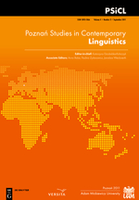
Poznan Studies in Contemporary Linguistics
Cultivating knowledge in the evolving field of linguistics.Poznan Studies in Contemporary Linguistics, published by DE GRUYTER MOUTON, is a pivotal journal in the field of linguistics, with an ISSN of 0137-2459 and an E-ISSN of 1897-7499. Located in Germany, this esteemed journal has consistently contributed to the academic landscape since its inception. As of 2023, it holds a Q2 category rank in Linguistics and Language and boasts commendable Scopus rankings, featuring in the 69th percentile for Arts and Humanities and the 66th percentile for Social Sciences. The journal emerges as a vital platform for scholars to explore contemporary linguistic theories and practices, making it an essential resource for researchers, professionals, and students alike. With a converged publication period from 2007 to 2024, it aims to facilitate a deeper understanding of linguistic advancements and trends. While the journal currently does not offer open access, its rigorous peer-review process ensures the highest quality of published research, strengthening its role as a leading discourse in the dynamic field of linguistics.
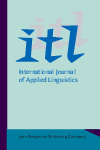
ITL-International Journal of Applied Linguistics
Championing excellence in applied linguistics research.ITL-International Journal of Applied Linguistics, published by JOHN BENJAMINS PUBLISHING CO in Belgium, stands as a leading journal in the field of applied linguistics and education, recognized for its rigorous scholarship and impactful contributions. With an impressive ranking of Q1 in both the Education and Linguistics and Language categories, ITL holds its place among the top journals globally, featuring in the Scopus rankings with a notable 91st percentile in both Arts and Humanities as well as Social Sciences. The journal aims to disseminate innovative research exploring the intersection of linguistics, language acquisition, and pedagogical practices, fostering a rich academic dialogue among researchers, educators, and practitioners. Though not currently an open access journal, ITL remains accessible to a broad readership, with an emphasis on high-quality, peer-reviewed articles that inform and inspire advancements in applied linguistics. The journal's commitment to academic excellence and relevance makes it an essential resource for those seeking to understand and contribute to the dynamic landscape of language studies.
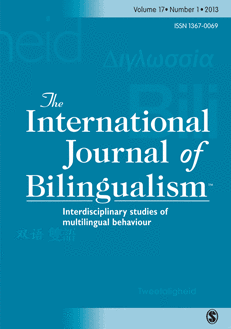
International Journal of Bilingualism
Navigating the complexities of bilingual education.The International Journal of Bilingualism, published by SAGE Publications Ltd, stands as a distinguished forum within the fields of Education and Linguistics, boasting an impressive Q1 ranking in both categories as of 2023. Since its inception in 1997, this journal has been at the forefront of bilingualism research, contributing to a deeper understanding of language use, acquisition, and policy in multilingual contexts. With its ISSN of 1367-0069 and E-ISSN 1756-6878, the journal serves a global audience of researchers, educators, and students dedicated to advancing knowledge in bilingualism. The journal is recognized for its rigorous peer-review process and high impact, indicated by its Scopus rankings, which place it in the top percentile among its peers. Although currently not offered as open access, the International Journal of Bilingualism remains an essential resource for cutting-edge research and dialogue in the dynamic field of bilingual studies, thereby significantly impacting educational practices and language policy decisions worldwide.

Language and Cognition
Diving Deep into Language's Role in Cognitive ProcessesLanguage and Cognition is a premier peer-reviewed journal published by Cambridge University Press, dedicated to advancing the fields of language, linguistics, and cognitive psychology. With an ISSN of 1866-9808 and E-ISSN of 1866-9859, it has rapidly established itself as a pivotal resource for researchers, educators, and practitioners alike. Recognized for its rigorous scholarship, the journal holds a Q1 ranking in Linguistics and Language and a Q2 ranking in Experimental and Cognitive Psychology for 2023, reflecting its esteemed positioning within the academic community. Since transitioning to open access in 2023, it has broadened its reach, making cutting-edge research accessible to a global audience. The journal's emphasis on interdisciplinary studies ensures a comprehensive exploration of the interactions between language and cognitive processes, fostering deeper insights and fostering collaboration across domains. Researchers and professionals looking to stay at the forefront of advancements in these vital areas will find Language and Cognition an invaluable platform for disseminating their findings and engaging with contemporary debates.

Functions of Language
Connecting Theory and Practice in Language ResearchFunctions of Language, published by John Benjamins Publishing Co, serves as a vital platform for scholars and practitioners in the fields of linguistics and language studies. With its ISSN 0929-998X and E-ISSN 1569-9765, this esteemed journal, based in the Netherlands, has solidified its reputation through a focused dedication to exploring the multifaceted roles that language plays across various contexts. Ranked in the top percentile of leading journals in Linguistics and Language (Q2 category, 2023) and holding impressive Scopus ranks within both the Arts and Humanities and Social Sciences sectors, the journal emphasizes research that interlinks theoretical insights with practical implications. Functions of Language aims to advance our understanding of linguistic structures and their applications, making it an essential resource for researchers, professionals, and students alike who are eager to contribute to the evolving discourse in language studies. With content converging from 1994 to 2024, the journal reflects ongoing scholarly engagement and innovation in the field.